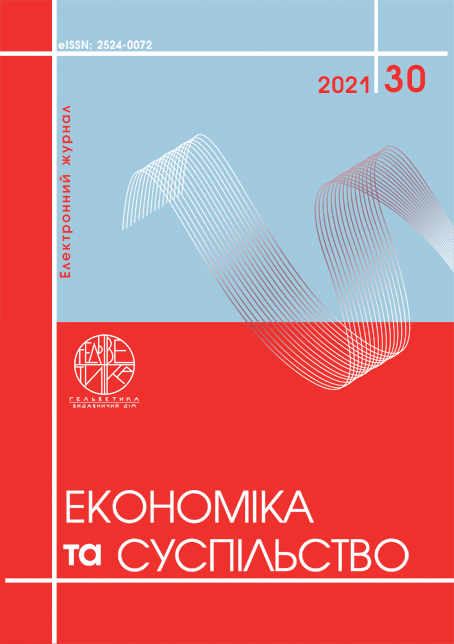POPULARIZATION OF NATIONAL TRADITIONAL ESTABLISHMENTS OF RURAL AND GREEN TOURISM IN UKRAINE
Abstract
The article is devoted to the study of topical issues of popularization of national traditional food establishments of rural and green tourism in Ukraine, which are built in the national style (tavern, pub, etc.) or are located in historic buildings. The essence of rural and green tourism was substantiated as one of the promising types of tourism, which successfully combines recreation in rural areas, sanitation and cognition of the historical and cultural objects of the region, and on the other hand – the diversity of economic activities of rural residents (owners) in order to provide own houses to vacationers (tourists) in the form of places for accommodation, meals and other services related to tourism, including using their own family members as workers. It’s determined that the basic concept of restaurants, which provide food services in the field of rural and green tourism is due to the presence of traditional cuisine and general ethnocultural atmosphere. There are mainly classic dishes and drinks of a high level of quality of preparation and service, usually national or author's cuisine. The article presents some food establishments that popularize national Ukrainian traditions. As a result of the study it was determined, that rural and green tourism is a seasonal and goes during warm season, so tourists would prefer outdoor recreation, in which case food establishments need to form open-air restaurant areas (summer restaurants). It’s determined, that summer restaurants could be a full-fledged independent restaurant. The main types of summer restaurants can be verandas, terraces, economy terraces, restaurant-transformer. In the modern world, tourism plays a strategic role in the economies of many countries and in the world economy as a whole. It has a stimulating effect on a significant number of industries, has a high pace of development and contributes to the preservation of the historical and cultural heritage of society. For Ukraine, which has significant tourist and recreational resources, the development of tourism industry, which stimulates the emergence of new types of entrepreneurial activity, is promising. The main prospects for further research in this area are to identify strategic directions for the development of rural and green tourism infrastructure in Ukraine, that will improve the quality of the proposed tourism product and increase the number of consumers.
References
Братіцел М.Л. Національні екокультурні традиції в сучасних ресторанних закладах. Культура і мистецтво у сучасному світі. 2019. Вип. 20. С. 44–52.
Воронюк Т.А. Тенденції розвитку підприємств ресторанного господарства у Чернівецькій області. Український журнал прикладної економіки. 2019. Том 4. № 2. С. 52–59.
Гловацька В.В Сільський зелений туризм: сутність, функції основи організації. Економіка АПК. 2006. № 10. С. 148–155.
ДСТУ 4281:2004. Заклади ресторанного господарства. Класифікація.
Кравченко Н. Роль сільського туризму в розвитку регіонів Полісся. Ніжин, 2007. 250 с.
Організація обслуговування у закладах ресторанного господарства : Підручник [для вищ. навч. закл.] / За ред. П’ятницької Н.О. 2-ге вид. перероб. та допов. Київ : Центр учбової літератури, 2011. 584 с.
П’ятницька Г.Т., Найдюк В.С. Сучасні тренди розвитку ресторанного господарства в Україні. Економіка та держава. 2017. № 9. С. 66–73.
Поколодна М.М., Семків М.О. Етнографічний туризм: особливості, географія та ресурсний потенціал. Міжнародний науковий журнал «Інтернаука». 2018. № 20.
Скрипник Н.Я., Сердюк А.М. Рекреаційна географія [текст] : навч. посібник. Київ : Центр учбової літератури, 2013. 296 с.
Смолій В.А., Федорченко В.К., Цибух В.І. Енциклопедичний словник-довідник з туризму. Київ : Видавничий дім «Слово», 2006. 366 с.
Bratitsel M.L. (2019) Natsionalni ekokulturni tradytsii v suchasnykh restorannykh zakladakh [National eco-cultural traditions in modern restaurants]. Kultura i mystetstvo u suchasnomu sviti, no. 20, pp. 44–52. (in Ukrainian)
Voroniuk T.A. (2019) Tendentsii rozvytku pidpryiemstv restorannoho hospodarstva u Chernivetskii oblasti [Trends in the development of restaurant enterprises in the Chernivtsi region]. Ukrainskyi zhurnal prykladnoi ekonomiky, T. 4. no 2, pp. 52–59. (in Ukrainian)
Hlovatska V.V. (2006) Silskyi zelenyi turyzm: sutnist, funktsii osnovy orhanizatsii [Rural green tourism: essence, functions of the basis of the organization]. Ekonomika APK, no 10, pp. 148–155. (in Ukrainian)
DSTU 4281:2004. Zaklady restorannoho hospodarstva. Klasyfikatsiia.
Kravchenko N. (2007) Rol silskoho turyzmu v rozvytku rehioniv Polissia [The role of rural tourism in the development of Polissya regions] posibnyk [a textbook]. Nizhyn, 250 p. (in Ukrainian)
Piatnytskoi N.O. (2011) Orhanizatsiia obsluhovuvannia u zakladakh restorannoho hospodarstva [Service in restaurants] posibnyk [a textbook]. Kyiv: Tsentr uchbovoi literatury, 584 p. (in Ukrainian)
Piatnytska H.T., Naidiuk V.S. (2017) Suchasni trendy rozvytku restorannoho hospodarstva v Ukraini [Modern trends in the development of the restaurant industry in Ukraine]. Ekonomika ta derzhava, no 9, pp. 66–73. (in Ukrainian)
Pokolodna M.M., Semkiv M.O. (2018) Etnohrafichnyi turyzm: osoblyvosti, heohrafiia ta resursnyi potentsial [Ethnographic tourism: features, geography and resource potential]. Mizhnarodnyi naukovyi zhurnal «Internauka», no. 20. (in Ukrainian)
Skrypnyk N.Ia. (2013) Rekreatsiina heohrafiia [Recreational geography] posibnyk [a textbook]. Kyiv: Tsentr uchbovoi literatury, 296 p. (in Ukrainian)
Smolii V.A. (2006) Entsyklopedychnyi slovnyk-dovidnyk z turyzmu [Encyclopedic dictionary-reference book on tourism]. Kyiv: Vydavnychyi dim «Slovo», 366 p. (in Ukrainian)


